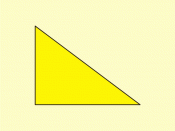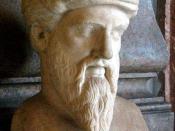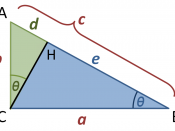Pythagoras of Samos
Pythagoras is sometimes thought of as the first true mathematician, yet little is known about his mathematical achievements. He was part of a religion that prescribed obedience, silence, abstinence from food, simplicity in dress and possessions, and the habit of frequent self-examinations. We do however credit him with the hypotenuse theory, also know as the Pythagorean theorem, and the theory of numbers. Most Greek mathematicians usually wrote books on their discoveries, but due to his strict lifestyle little was found on him.
There is a small amount of information which is found in biographies written by those who thought Pythagoras had divine powers. His father was said to be a merchant named Mnesarchus, and his mother was Pythais. There were conflicting sources, some said he has two brothers while some said he has three. Pythagoras was also said to have a large birthmark on his lower thigh.
Some of his known hobbies included playing the lyre and reading poetry. He was obviously a well educated child and could recite Homer with the greatest of ease. As a youth, he has several philosophers who are credited with sparking his interest in mathematics and astrology: Anaximenes, Thales, and Anaximander. His mentors were particularly interested in the area of geometry.
In 535 BC, Pythagoras went to Egypt where he was taught geometry. Pythagoras made a journey to Crete shortly after his return to Samos (his birthplace) to study the system of laws there. When he went back Samos he founded a school which was called the semicircle. In 518 BC left Samos and went to Italy. While there he started a philosophical and religious school. At the school he has a society where he and the other members, some who became famous philosophers, studied the principals of mathematics,



Nice overview
I like how you summarize and give specific examples of his work. I would recommend taking "I" out of the last paragraph; Instead say, "Proclus, a later Greek philosopher, said this of the genius, "..."
3 out of 3 people found this comment useful.